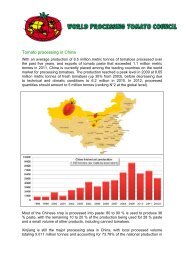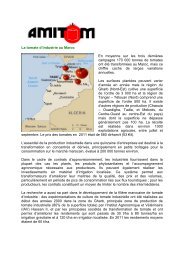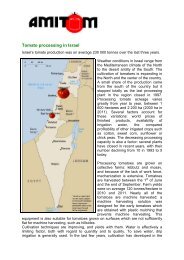- Page 2:
Introduction The European Commissio
- Page 6:
Composition of tomatoes and tomato
- Page 10:
Composition of tomatoes and tomato
- Page 14:
Composition of tomatoes and tomato
- Page 18:
Composition of tomatoes and tomato
- Page 22:
Composition of tomatoes and tomato
- Page 26:
Composition of tomatoes and tomato
- Page 30:
Composition of tomatoes and tomato
- Page 34:
Composition of tomatoes and tomato
- Page 38:
Composition of tomatoes and tomato
- Page 42:
Composition of tomatoes and tomato
- Page 46:
Composition of tomatoes and tomato
- Page 50:
Composition of tomatoes and tomato
- Page 54:
Composition of tomatoes and tomato
- Page 58:
Composition of tomatoes and tomato
- Page 62:
Composition of tomatoes and tomato
- Page 66:
Composition of tomatoes and tomato
- Page 70:
Composition of tomatoes and tomato
- Page 74:
Composition of tomatoes and tomato
- Page 78:
Composition of tomatoes and tomato
- Page 82:
Composition of tomatoes and tomato
- Page 86:
Composition of tomatoes and tomato
- Page 90:
Composition of tomatoes and tomato
- Page 94:
Composition of tomatoes and tomato
- Page 98:
Composition of tomatoes and tomato
- Page 102:
Composition of tomatoes and tomato
- Page 106:
Composition of tomatoes and tomato
- Page 110:
Composition of tomatoes and tomato
- Page 114:
Composition of tomatoes and tomato
- Page 118:
Composition of tomatoes and tomato
- Page 122:
Composition of tomatoes and tomato
- Page 126:
Composition of tomatoes and tomato
- Page 130:
Composition of tomatoes and tomato
- Page 134:
Composition of tomatoes and tomato
- Page 138:
Composition of tomatoes and tomato
- Page 142:
Composition of tomatoes and tomato
- Page 146:
Composition of tomatoes and tomato
- Page 150:
Composition of tomatoes and tomato
- Page 154:
Composition of tomatoes and tomato
- Page 158:
Composition of tomatoes and tomato
- Page 162:
Composition of tomatoes and tomato
- Page 166:
Composition of tomatoes and tomato
- Page 170:
Composition of tomatoes and tomato
- Page 174:
Composition of tomatoes and tomato
- Page 178:
Composition of tomatoes and tomato
- Page 182:
Composition of tomatoes and tomato
- Page 186:
Composition of tomatoes and tomato
- Page 190:
Composition of tomatoes and tomato
- Page 194:
Composition of tomatoes and tomato
- Page 198:
Composition of tomatoes and tomato
- Page 202:
Composition of tomatoes and tomato
- Page 206:
Composition of tomatoes and tomato
- Page 210:
Composition of tomatoes and tomato
- Page 214:
Processing and Bioavailability (WG2
- Page 218:
Processing and Bioavailability (WG2
- Page 222:
Processing and Bioavailability (WG2
- Page 226:
Processing and Bioavailability (WG2
- Page 230:
Processing and Bioavailability (WG2
- Page 234:
Processing and Bioavailability (WG2
- Page 238:
Processing and Bioavailability (WG2
- Page 242:
Processing and Bioavailability (WG2
- Page 246:
Processing and Bioavailability (WG2
- Page 250:
Processing and Bioavailability (WG2
- Page 254:
Processing and Bioavailability (WG2
- Page 258:
Processing and Bioavailability (WG2
- Page 262:
Processing and Bioavailability (WG2
- Page 266:
Processing and Bioavailability (WG2
- Page 270:
Processing and Bioavailability (WG2
- Page 274:
Processing and Bioavailability (WG2
- Page 278:
Processing and Bioavailability (WG2
- Page 282:
Processing and Bioavailability (WG2
- Page 286:
Processing and Bioavailability (WG2
- Page 290:
Processing and Bioavailability (WG2
- Page 294:
Processing and Bioavailability (WG2
- Page 298:
Processing and Bioavailability (WG2
- Page 302:
Processing and Bioavailability (WG2
- Page 306:
Processing and Bioavailability (WG2
- Page 310:
Processing and Bioavailability (WG2
- Page 314:
Processing and Bioavailability (WG2
- Page 318:
Processing and Bioavailability (WG2
- Page 322:
Processing and Bioavailability (WG2
- Page 326:
Processing and Bioavailability (WG2
- Page 330:
Processing and Bioavailability (WG2
- Page 334:
Processing and Bioavailability (WG2
- Page 338:
Processing and Bioavailability (WG2
- Page 342:
Processing and Bioavailability (WG2
- Page 346:
Processing and Bioavailability (WG2
- Page 350:
Processing and Bioavailability (WG2
- Page 354:
Processing and Bioavailability (WG2
- Page 358:
Processing and Bioavailability (WG2
- Page 362:
Processing and Bioavailability (WG2
- Page 366: Processing and Bioavailability (WG2
- Page 370: Processing and Bioavailability (WG2
- Page 374: Observational epidemiological surve
- Page 378: Observational epidemiological surve
- Page 382: Observational epidemiological surve
- Page 386: Observational epidemiological surve
- Page 390: Observational epidemiological surve
- Page 394: Observational epidemiological surve
- Page 398: Observational epidemiological surve
- Page 402: Observational epidemiological surve
- Page 406: Observational epidemiological surve
- Page 410: Observational epidemiological surve
- Page 414: Observational epidemiological surve
- Page 420: Observational epidemiological surve
- Page 424: Observational epidemiological surve
- Page 428: Negri et al., 1996-a La Vecchia et
- Page 432: Observational epidemiological surve
- Page 436: Observational epidemiological surve
- Page 440: Observational epidemiological surve
- Page 444: Observational epidemiological surve
- Page 448: Observational epidemiological surve
- Page 452: Observational epidemiological surve
- Page 456: Observational epidemiological surve
- Page 460: Observational epidemiological surve
- Page 464: Observational epidemiological surve
- Page 468:
Observational epidemiological surve
- Page 472:
Observational epidemiological surve
- Page 476:
Observational epidemiological surve
- Page 480:
Observational epidemiological surve
- Page 484:
Klipstein- Grobush et al., (1999) Y
- Page 488:
Observational epidemiological surve
- Page 492:
Observational epidemiological surve
- Page 496:
Observational epidemiological surve
- Page 500:
Observational epidemiological surve
- Page 504:
Observational epidemiological surve
- Page 508:
Table 39 Age related macular degene
- Page 512:
Table 40 Vitamin C and cataract Obs
- Page 516:
Table 41 Vitamin E and cataract Obs
- Page 520:
Observational epidemiological surve
- Page 524:
Observational epidemiological surve
- Page 528:
Observational epidemiological surve
- Page 532:
Observational epidemiological surve
- Page 536:
Observational epidemiological surve
- Page 540:
Observational epidemiological surve
- Page 544:
Observational epidemiological surve
- Page 548:
Observational epidemiological surve
- Page 552:
Observational epidemiological surve
- Page 556:
Observational epidemiological surve
- Page 560:
Mechanisms and Biomarkers (WG 4) pa
- Page 564:
Mechanisms and Biomarkers (WG 4) pa
- Page 568:
Mechanisms and Biomarkers (WG 4) pa
- Page 572:
Mechanisms and Biomarkers (WG 4) pa
- Page 576:
Mechanisms and Biomarkers (WG 4) pa
- Page 580:
Mechanisms and Biomarkers (WG 4) pa
- Page 584:
Mechanisms and Biomarkers (WG 4) pa
- Page 588:
Mechanisms and Biomarkers (WG 4) pa
- Page 592:
Mechanisms and Biomarkers (WG 4) pa
- Page 596:
Mechanisms and Biomarkers (WG 4) pa
- Page 600:
Mechanisms and Biomarkers (WG 4) pa
- Page 604:
Mechanisms and Biomarkers (WG 4) pa
- Page 608:
Mechanisms and Biomarkers (WG 4) pa
- Page 612:
Mechanisms and Biomarkers (WG 4) pa
- Page 616:
Mechanisms and Biomarkers (WG 4) pa
- Page 620:
Mechanisms and Biomarkers (WG 4) pa
- Page 624:
Mechanisms and Biomarkers (WG 4) pa
- Page 628:
Mechanisms and Biomarkers (WG 4) pa
- Page 632:
Mechanisms and Biomarkers (WG 4) pa
- Page 636:
Mechanisms and Biomarkers (WG 4) pa
- Page 640:
Mechanisms and Biomarkers (WG 4) pa
- Page 644:
Mechanisms and Biomarkers (WG 4) pa
- Page 648:
Mechanisms and Biomarkers (WG 4) pa
- Page 652:
Mechanisms and Biomarkers (WG 4) pa
- Page 656:
Mechanisms and Biomarkers (WG 4) pa
- Page 660:
Mechanisms and Biomarkers (WG 4) pa
- Page 664:
Mechanisms and Biomarkers (WG 4) pa
- Page 668:
Mechanisms and Biomarkers (WG 4) pa
- Page 672:
Mechanisms and Biomarkers (WG 4) pa
- Page 676:
Mechanisms and Biomarkers (WG 4) pa
- Page 680:
Mechanisms and Biomarkers (WG 4) pa
- Page 684:
Mechanisms and Biomarkers (WG 4) pa
- Page 688:
Mechanisms and Biomarkers (WG 4) pa
- Page 692:
Mechanisms and Biomarkers (WG 4) pa
- Page 696:
Mechanisms and Biomarkers (WG 4) pa
- Page 700:
Mechanisms and Biomarkers (WG 4) pa
- Page 704:
Mechanisms and Biomarkers (WG 4) pa
- Page 708:
Mechanisms and Biomarkers (WG 4) pa
- Page 712:
Mechanisms and Biomarkers (WG 4) pa
- Page 716:
Mechanisms and Biomarkers (WG 4) pa









